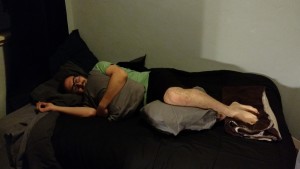Sleep is the new skinny — with a booming industry to help us get rest
JULY 6, 2017 | THE PULSE | BY ANDREW STELZER | NewsWorks.org

Zach Goldberg has had major trouble sleeping for much of the past decade. White noise, black-out shades, avoiding screens before bedtime — none of those adjustments were enough for Goldberg.
“In high school and in college, I would spend maybe three or four nights a month just awake until like five, six [in the morning],” says Goldberg.
Then he discovered the magic secret, for him: Harry Potter audiobooks.
As he gets ready for bed, Goldberg presses play on an iPod especially dedicated for this purpose — and the story continues where he left off last night. He says it’s his ninth time going through this book over the past five years.
“My own insomnia is basically like: I can’t stop thinking. My brain will continue running, even though I know it’s time to go to sleep, and my body is very tired but my brain doesn’t stop,” Goldberg explains. “So if I distract my brain with something that’s like this calming British man talking about a fictional wizarding school, it generally makes my brain sort of focus on that and then shuts down,” he adds.
Exhaustion: an American tradition
Goldberg’s technique may seem bizarre, but lots of American do all sorts of odd things to get a good night’s sleep. As a nation, that’s a relatively new obsession for us.
For a long time, the American way used to be to work hard, and to even brag about how little sleep you got.
But somewhere in the past generation we started to change our minds. Nap stations are popping up in office buildings, some high schools are starting the school day later, and lots of us have realized that poor sleep has negative effects on our health.
Michael Grandner, director of the Sleep & Health Research Program at the University of Arizona, says he has patients with mild sleep problems come to him all the time, worried they have insomnia and asking if they should undergo an in-depth sleep study.
“About a third of the population is reporting about six hours of sleep or less, which has been linked in general to things like a shorter life span, or risk for more things like heart disease and diabetes, obesity and performance deficits, and depression and substance use,” Grander says.
But most of the time medical help is not necessary.
“At the end of the day, insomnia is a word. It’s a word to describe a bunch of different things,” Grandner says. “Think of it like depression: Everyone gets depressed sometimes and sad, and it’s normal, and often it’ll go away on its own. Sometimes it’s a little more than that, and we need to do stuff.”
Often people need basic improvements to what’s known as “sleep hygiene.”
“Hygiene isn’t treatment,” Grandner said. “Doing things like avoiding caffeine in the afternoon, and getting plenty of light during the day, getting exercise, avoiding water at night, avoiding heavy meals before going to bed, not taking naps too late — these are all sleep hygiene.”
Tech to sleep by
For the most part, we just need to have an active day, and a relaxing bedtime routine.
But there’s a billion dollar marketing machine out there, working all through the night to convince us that we need some sort of additional help — like Ambien, or the right adjustable mattresses.
Troubled sleepers also have a host of tech products to choose from, from wearables like the fitbit activity tracker to smartphone apps that claim to wake you up at the optimum point in your sleep cycle. One of the most hyped is a product called Sense.
It’s a white three -inch sphere that sits on the table by your bed. It’s billed as a revolutionary sound machine, sleep monitor, and smart alarm all in one. It retails for $149.
Hello, the company that makes Sense, initially raised more than $40 million in Silicon Valley startup funding in 2015. By June of this year, they announced the project was shutting down. Jeff Mann, who runs the website sleepjunkies.com, says Sense doesn’t really do much, so he isn’t surprised the product might be going away.
“A lot of the products that have sort of fallen off the radar are the more gimmicky ones,” says Mann, who reviews sleep gadgets and apps on his site. He says most of the so-called solutions are unproven and simply inform us about how we sleep.
“What people learn from sleep trackers are sort of numbers, and it’s not actually useful for them,” and without a way to use that information, people lose interest in their new toy, Mann says.
“People buy these things, and ‘Oh, that’s interesting. I only slept six hours last night.’ And then a week later they go, ‘It’s not that interesting.’ And then another week later, it’s “Oh, I can’t be bothered to wear this anymore,'” he says.
The most promising future of the sleep-tech industry, says Mann, is in the information wearable and in-home gadgets gather — a larger information set than any scientific sleep study could ever amass.
Down the line, researchers with a whole bunch of data might be able to learn something that helps us all sleep better at night.




